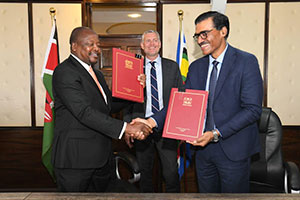To reach more kids and teenagers with the disease, Kenya is attempting to open more type 1 diabetes clinics.
The Danish multinational pharmaceutical company Novo Nordisk will pay Sh2.4 billion over the course of the next three years to support the “Changing Diabetes in Children Project.”
The pancreas produces very little or no insulin in people with type 1 diabetes, formerly known as juvenile diabetes or insulin-dependent diabetes. Building healthcare personnel’ capacity will be prioritised.
The project seeks to provide children and adolescents with free access to human insulin and blood glucose monitoring technology, as well as medical and laboratory supplies.
The creation of a registry for children and adolescents with type 1 diabetes is on the agenda.
Families of children and adolescents with type 1 diabetes will receive education.
Health CS Mutahi Kagwe stated that the program’s long-term goal is to develop ways to incorporate programme elements into the nation’s healthcare delivery system in addition to improving the lives of the children who are enrolled in the initiative.
Through enduring relationships and collaborations, the CS continued, “We want to utilise our various capabilities and strengths with a view to enhancing the well-being of persons living with diabetes in Kenya as well as improving diabetes care for children with type 1 diabetes in the country.”
In accordance with the collaboration, the Kenyan government would be required to see to it that type 1 diabetes is included in the national agenda for non-communicable diseases.
In order to organise and run the diabetic clinics and patient registry, Novo Nordisk will be expected to offer the necessary diagnostic, screening, and monitoring tools.
Additionally, it will be necessary to supply free human insulin to address type 1 diabetes treatment needs for kids, teens, and adults up to the age of 25 in the healthcare facilities funded by the project.
Additionally, the business will be expected to support awareness initiatives in cooperation with other stakeholders and healthcare professionals’ training in the management of type 1 diabetes.
It will assist in generating patient education materials for the CDiC Project and supporting the development of infrastructure in some diabetic clinics as determined by the Ministry of Health. It will also promote diabetes self-management education for kids, teens, and their families.

